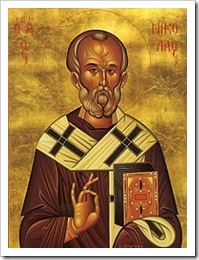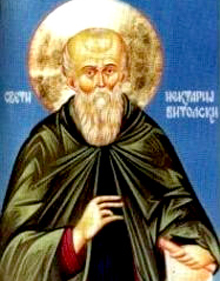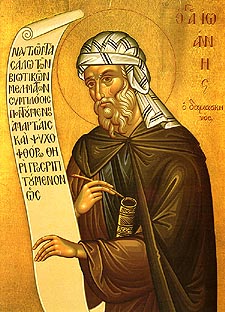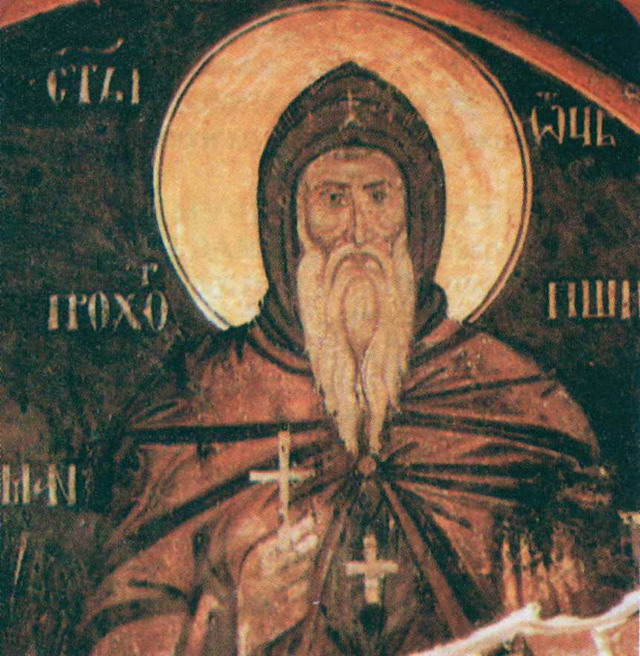Theology
Weekly Diocesan Bulletin - Sunday, December 24, 2017
23. December 2017 - 20:34 TWENTY-NINTH SUNDAY AFTER PENTECOST: THE HOLY FOREFATHERS OF THE OLD COVENANT; VENERABLE DANIEL THE STYLITE; SERBIAN MOTHER’S DAY
TWENTY-NINTH SUNDAY AFTER PENTECOST: THE HOLY FOREFATHERS OF THE OLD COVENANT; VENERABLE DANIEL THE STYLITE; SERBIAN MOTHER’S DAY
RESURRECTIONAL TROPARION - TONE FOUR:
When the women disciples of the Lord learned from the angel the joyous message of Thy Resurrection; they cast away the ancestral curse and elatedly told the apostles: Death is overthrown! Christ God is Risen, granting the world great mercy.
The Winter Pascha, Chapter 8: St. Nicholas
20. December 2017 - 9:42 The following is an excerpt from The Winter Pascha, by Fr. Thomas Hopko
The following is an excerpt from The Winter Pascha, by Fr. Thomas Hopko
The Feast of St. Nicholas
Following the feast of St. Andrew, prefeast hymns of the Nativity are heard once again on the feast of St. Nicholas, the fourth-century bishop of Myra in Lycia who through the ages had come to be especially connected with the festival of Christ's birth.
O you who love the festivals,
Come gather and sing the praises of the fair beauty of bishops,
The glory of the fathers,
Venerable Nectarius of Bitola
19. December 2017 - 8:44 Saint Nectarius was born in Bitola. He led the ascetic struggle in the Monastery of the Holy Unmercenaries Cosmas and Damian near Bitola, together with his own father Pachomius who had also become a monk. Then he left for Karyes on Mount Athos where he continued his struggle under the spiritual direction of the Elders Philotheus and Dionysius at the Lavra of the Holy Archangels.
Saint Nectarius was born in Bitola. He led the ascetic struggle in the Monastery of the Holy Unmercenaries Cosmas and Damian near Bitola, together with his own father Pachomius who had also become a monk. Then he left for Karyes on Mount Athos where he continued his struggle under the spiritual direction of the Elders Philotheus and Dionysius at the Lavra of the Holy Archangels.
Having conquered the envy of men, assaults of demons and painful illnesses, he inhabited Christ’s Kingdom on 5/18 December 1500. His miracle working relics, incorrupt and fragrant, rest at the same Lavra.
Life of Saint Nicholas the Wonderworker, Archbishop of Myra
18. December 2017 - 23:30 This glorious saint, celebrated even today throughout the entire world, was the only son of his eminent and wealthy parents, Theophanes and Nona, citizens of the city of Patara in Lycia. Since he was the only son bestowed on them by God, the parents returned the gift to God by dedicating their son to Him.
This glorious saint, celebrated even today throughout the entire world, was the only son of his eminent and wealthy parents, Theophanes and Nona, citizens of the city of Patara in Lycia. Since he was the only son bestowed on them by God, the parents returned the gift to God by dedicating their son to Him.
St. Nicholas learned of the spiritual life from his uncle Nicholas, Bishop of Patara, and was tonsured a monk in the Monastery of New Zion founded by his uncle. Following the death of his parents, Nicholas distributed all his inherited goods to the poor, not keeping anything for himself. As a priest in Patara, he was known for his charity, even though he carefully concealed his charitable works, fulfilling the words of the Lord: Let not thy left hand know what thy right hand doeth (Matthew 6:3).When he gave himself over to solitude and silence, thinking to live that way until his death, a voice from on high came to him: ``Nicholas, for your ascetic labor, work among the people, if thou desirest to be crowned by Me.'' Immediately after that, by God's wondrous providence, he was chosen archbishop of the city of Myra in Lycia. Merciful, wise and fearless, Nicholas was a true shepherd to his flock.
Martyr John of Damascus
17. December 2017 - 14:46 Saint John of Damascus was born about the year 680 at Damascus, Syria into a Christian family. His father, Sergius Mansur, was a treasurer at the court of the Caliph. John had also a foster brother, the orphaned child Cosmas (October 14), whom Sergius had taken into his own home. When the children were growing up, Sergius saw that they received a good education. At the Damascus slave market he ransomed the learned monk Cosmas of Calabria from captivity and entrusted to him the teaching of his children. The boys displayed uncommon ability and readily mastered their courses of the secular and spiritual sciences. After the death of his father, John occupied ministerial posts at court and became the city prefect.
Saint John of Damascus was born about the year 680 at Damascus, Syria into a Christian family. His father, Sergius Mansur, was a treasurer at the court of the Caliph. John had also a foster brother, the orphaned child Cosmas (October 14), whom Sergius had taken into his own home. When the children were growing up, Sergius saw that they received a good education. At the Damascus slave market he ransomed the learned monk Cosmas of Calabria from captivity and entrusted to him the teaching of his children. The boys displayed uncommon ability and readily mastered their courses of the secular and spiritual sciences. After the death of his father, John occupied ministerial posts at court and became the city prefect.
Saint Joannicius of Devic (+ 1430)
15. December 2017 - 10:16 Commemorated on December 2 / December 15
Commemorated on December 2 / December 15
Joannicius was a Serb from Zeta. As a young man he was overhelmed with love for Christ. He left his home and family and withdrew to the region of Ibar at the mouth of the Black River into a narrow cave in which, according to tradition, before him, St. Peter of Korish lived a life of ascetism. When his fame began to spread among the people, he fled to Drenica and hid in the thick forest of Devich. Here St. Joannicius spent years of solitude, in silence and in prayer. According to tradition, the Serbian Prince George Brankovich brought his mentally ill daughter to him whom the Saint healed. Out of gratitude, George built a monastery on this spot, known today by the name of Devic. The holy and wonder-working relics of Joannicius repose in this monastery. In this monastery, more recently, the nun Euphemia, the famous and God-pleasing hermitess lived a life of ascetism in Devic. The nun Euphemia is better known in the area of Kosovo by the name: The Blessed Stojna. She died in the Lord in the year 1895 A.D.

